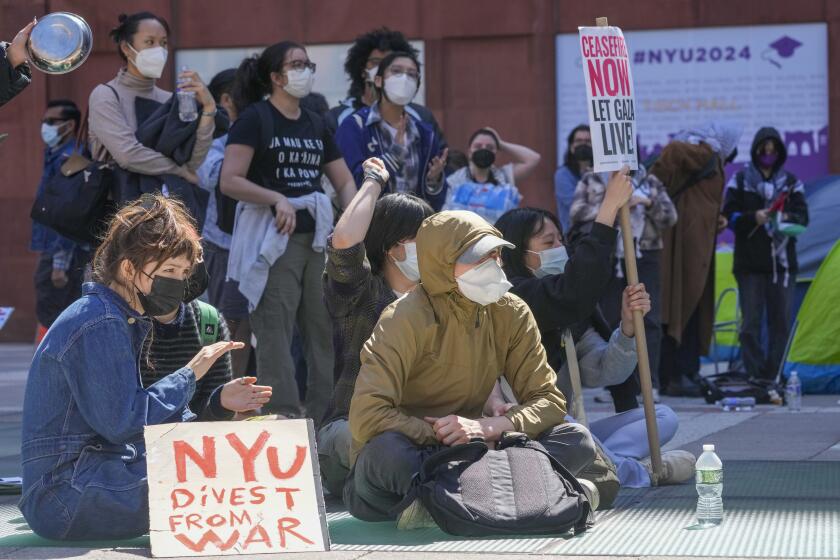States Move to Strengthen Laws on Hostile Takeovers
States, emboldened by the Supreme Court’s landmark decision Tuesday upholding Indiana’s anti-takeover rules, have begun moving quickly to strengthen laws that would stymie hostile raids on corporations.
Delaware on Wednesday became the first to follow Indiana’s lead, with the state administration declaring that it will ask its Legislature immediately to enact a tougher corporate takeover law.
Corporate takeover strategists were anxiously awaiting Delaware’s reaction because as many as 250 of the nation’s largest corporations are incorporated there and the state has become an important barometer of corporate takeover trends.
In California, state Sen. Dan McCorquodale (D-San Jose) said Wednesday that a package of anti-takeover legislation scheduled for Senate hearings next week will be strengthened and rewritten in the Indiana mold.
Altogether, as many as 40 states are expected to enact legislation similar to the Indiana statute, which gives shareholders in companies organized in that state the right to decide if certain investors may vote their shares.
The Indiana law bars a suitor or any other investor who buys 20% or more of a company’s stock from voting his shares until a majority of the company’s other shareholders--excluding inside directors and officers--approve. Investors who later increase their holdings above certain levels also can be denied voting power by shareholders.
Another key provision of the Indiana law is that a company management has up to 50 days to mobilize its defenses against a hostile takeover bid, 30 days longer than federal law requires.
By modeling their laws on Indiana’s, states will “put a chill into the takeover business,” predicted Charles M. Oberly III, Delaware’s attorney general.
Highly leveraged takeovers will suffer the brunt of the blow, predicted Rodman Ward, a partner in the Delaware office of the Wall Street law firm of Skadden, Arps, Slate, Meagher & Flom, because lenders would not be inclined to lend money to a suitor whose deal could routinely be delayed as long as 50 days.
Warn of Stampede
Critics of the Supreme Court’s ruling--which took many of the nation’s top takeover strategists by surprise--also warn that a stampede by states to get tough with corporate raiders could have devastating effects on the economy.
“This promises to cause enormous risk and uncertainty whenever a company is undergoing a change of management, and all of those companies that should have been put to bed five years ago will just keep stagnating now because no one is going to bother to come in and force sudden changes,” said John Pound, a former economist for the Securities and Exchange Commission who is co-director of a project on investor behavior at Yale University.
Pound also said he considers the Indiana law that now promises to be the model for dozens of states to be “extremely disenfranchising” because it “says to me as a shareholder that other shareholders . . . can take my rights away.”
Thus, he and others predict that the court’s ruling will trigger a face-off between federal securities regulators and the states.
‘One Share, One Vote’
The SEC, which had argued in court briefs that the Indiana law was invalid, is expected to publicly endorse the longstanding principle of “one-share, one-vote,” which has also come under attack recently. Since the Indiana statute favors some shareholders over others, it is “a direct challenge to one-share, one-vote, and the SEC just may find a way to delist any company that tries to use it,” Pound predicted.
An SEC spokesman declined to comment on Pound’s theory.
Because Delaware is so important to corporate takeover law, its decision to propose an amendment to its takeover laws is almost certain to trigger another round of legal challenges.
Securities law experts predicted Wednesday that any legal challenge is sure to center on the fact that the vast majority of companies organized under Delaware law do most of their business outside of Delaware. The Indiana law applies to companies that not only are incorporated in that state but have their principal offices or substantial assets there as well as at least 10% of their shareholders.
States, fearing the loss of jobs and tax revenues and the disruption to business that often accompanies corporate takeovers, have become increasingly aggressive in their efforts to thwart hostile takeovers despite a serious blow to their efforts by the Supreme Court in 1982. That year, the court struck down a state law similar to 36 others that tried to regulate tender offers--public offers to buy shares at a specified price--at the state level.
Back to Drawing Board
The states went back to the drawing board and 20 subsequently emerged with so-called “second-generation” anti-takeover statutes that try to protect shareholders’ rights without actually forcing raiders to face a state review of their offers. Ohio and Pennsylvania have laws resembling Indiana’s; most others are not as stringent.
While California’s McCorquodale said he will take the “safer road” and use Indiana’s law as a model instead of trying to break still more new ground, some takeover specialists predict that the Supreme Court’s ruling will make states braver as they take on corporate raiders.
“There is room in that decision to adopt even more restrictive laws,” said John Pritchard, a New York lawyer who successfully defended Indiana before the Supreme Court.
More to Read
Start your day right
Sign up for Essential California for news, features and recommendations from the L.A. Times and beyond in your inbox six days a week.
You may occasionally receive promotional content from the Los Angeles Times.






